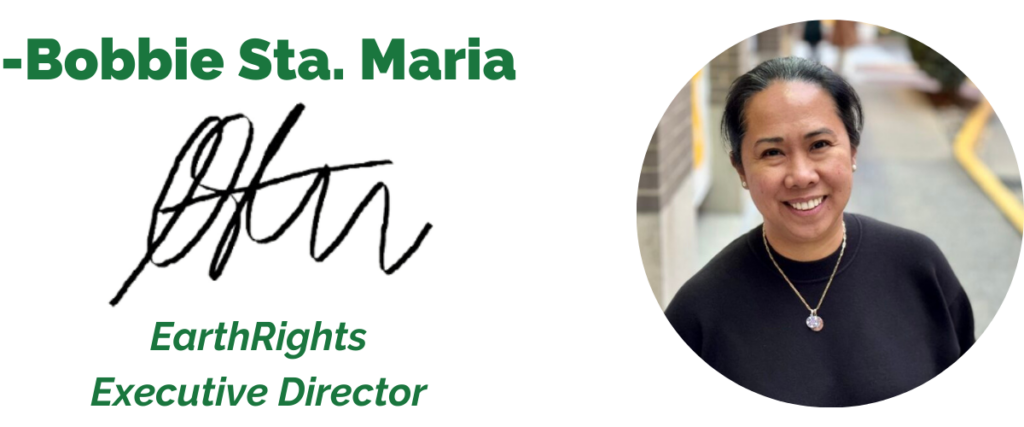MISSION
EarthRights combines the power of law and the power of people to defend human rights and the environment.
VISION
We envision a world where every community has the power to seek justice, defend their rights, and hold corporations, financial institutions, and governments accountable; a world where people live with dignity and self-determination, and where the environments that sustain us are fiercely protected and restored. In the face of the climate crisis, we see a future built on resilience, equity, and the unwavering defense of human rights and the planet.
“We sincerely hope that this fight to protect the community will lead to the victory of our community. So that we can continue to have a way of life, environment and a culture to pass down to our children and grandchildren in the future.” — Header photo of Tangauay Pholtawit, a member of the Kaboedin community attending the fifth anniversary of the Omkoi Anti-Mining Campaign on Dec 7, 2024.
A YEAR OF LEGAL VICTORIES
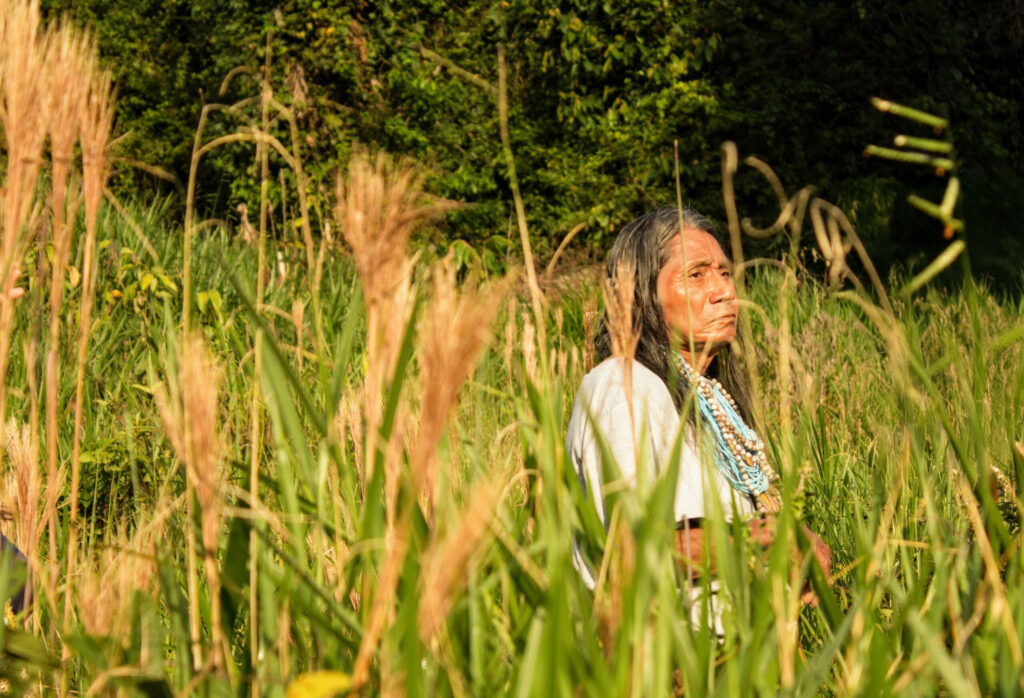
“This is the achievement of 30 years of struggle, and this accomplishment will leave a lasting legacy for our children — a history marked by our leaders who have tirelessly fought to demand the right to territory, the right to life, environmental rights, and cultural rights, in accordance with our sacred laws. This is a story we share with the country and the entire world — that we are indeed capable of defending our rights,” Bladimir Moreno Torres, former president of AsoU’wa
For the U’wa Indigenous People, protecting and defending Mother Earth is a divine mandate required of them by their God, Sira, and it is a responsibility they have embraced with unwavering determination. For decades, they have stood up against extractive and tourism projects imposed without their consent, as well as the militarization of their territory, which threatens their culture and existence.
Over the years, their struggle has taken many forms: peaceful demonstrations, legal complaints and petitions before national and international bodies, and an unbreakable defense of life and nature. They have used legal mechanisms to assert their rights and demonstrate that their cause is both just and necessary in a country where the rights of Indigenous Peoples have historically been violated in favor of economic interests.
In 1997, after years of struggle, the Colombian Constitutional Court issued a ruling recognizing their right to prior consultation. However, violations of their rights continued. For over 25 years, the U’wa persevered. Finally, in December 2024, the Inter-American Court of Human Rights recognized the responsibility of the Colombian state for violating their territorial, cultural, and environmental rights. The ruling not only legitimized their fight for truth and justice but also ordered more than ten reparative measures, setting an important precedent for the protection of Indigenous rights throughout the region.
When EarthRights joined the case during its final stage before the Court, we worked hand-in-hand with the U’wa People to build a legal strategy that combined international human rights law with the U’wa’s Law of Origin. The court recognized their worldview as a fundamental element in establishing the responsibility of the state for the violation of their rights. The court also established that the U’wa’s relationship with their territory defines their identity and life project as a Nation and that any harm to their land is a direct threat to their physical and cultural survival.
For EarthRights, it was an honor to be part of this case — it was the first case we brought before the Inter-American Court of Human Rights. For me, as a lawyer and the director of the Amazon Program, it has been a privilege to lead this process, which has allowed me to immerse myself in and understand the U’wa culture, their way of understanding the world, and their relationship with nature. It has encouraged me to question and evaluate the ways in which we traditionally use the law and to explore new strategies. The courage and strength of the U’wa People have shown me the immense power of Indigenous communities and the importance of continuing to work alongside them.
“It’s a triumph of a process that has been going on for almost 17 years, for all of us who have suffered so much during these years. There’s a debate about justice and reparation; we’ve been fighting since 2007. We’re not in this process because we want to be; it was Chiquita, with its actions, that dragged us into it. We have a responsibility to our families, and we must fight for them,” said a victim of the violence in Urabá, Colombia.
Our case against Chiquita Brands International held the corporation accountable for its payments to the United Self-Defense Forces of Colombia (AUC), a paramilitary organization responsible for extensive war crimes against civilians in Colombia during the country’s armed conflict.
This verdict was the first time a U.S. jury held a multinational corporation liable for human rights abuses abroad. This was a significant step towards justice for the thousands of families with unresolved claims.
Chiquita paid the AUC and its precursors over $1.7 million between 1997 and 2004 to protect their financial interests and suppress labor unions affecting their operations. These payments contributed to the deaths of thousands of civilians. These civilians were unionists, community leaders, and residents of the banana-growing regions of Uraba and Magdalena.
In 2007, Chiquita pleaded guilty to financing the AUC and paid a $25 million fine to the U.S. government, exposing their complicity in the violence. Thousands of Colombian families, yet to receive any reparations, then sued Chiquita in the United States for their role in the murders of their loved ones. EarthRights represents around 500 individuals from these thousands of Colombian families.
In 2024, after 17 years of litigation and hard-fought legal battles, the first jury trial in the case was held in the United States District Court for the Southern District of Florida on a small number of these claims. The jury determined that Chiquita is liable for the deaths of eight Colombian men who were murdered by the AUC and awarded over $38 million in damages to the eight families.
FIGHTING SINCE 2007
There were many times throughout the last 17 years of litigation where we felt like justice was out of reach. No one understands this better than our clients, who patiently fought this fight for years, without losing sight of what it may mean for thousands of families that have also experienced a loss like theirs.
During the trial, each story conveyed immense loss, even decades after their loved ones’ deaths. The plaintiffs traveled to a foreign country to recount some of the most painful moments of their lives. They told their stories in a U.S. court – one of the biggest stages available – and saw a jury return in favor.
We feel incredibly honored to work on this case with our colleagues, our clients, and our partners in Colombia in their fight for accountability. The beginning of the trial felt like a momentous turning point in this long struggle, after thousands of hours dedicated to arriving at that moment. It will come as no surprise that going to court every day alongside our brilliant team is among the weightiest professional responsibilities we have ever experienced. We made an important effort to ensure that the jury understood what happened here, which was an incredible challenge and a mix of feelings that is difficult to describe.
The support felt from around the world was tremendous. We know this case means a great deal to our clients and to the people of Colombia, including our close friends and Colombian colleagues. It means a great deal to us, too. Helping establish Chiquita’s complicity in the tragic deaths of civilians and doing our small part to achieve some semblance of justice has been deeply meaningful. The case is a lesson in what is possible when people assert their rights and persevere. It affirms our choice to do this work. We are proud of the families we represent and our team. This is simply the beginning – there is more justice to come.
“We, the families of the victims, are satisfied with the agreement. From the bottom of our hearts, we hope that armed violence will cease to be a tool in the areas around the world, where the institutions financed by the IFC defendants operate, so that this story of blood, death and pain will not be repeated,” said a survivor of the violence from Honduras.
In late 2024, EarthRights won court approval for a settlement in Doe v. International Finance Corporation (IFC), our case alleging that the IFC, a World Bank Group entity, abetted murder and other violence in Honduras.
This settlement is the first time any international financial institution has agreed to provide a remedy to end a lawsuit brought by an injured community, creating a historic precedent.
EarthRights filed the class action lawsuit in 2017 in a federal court in Delaware on behalf of rural families in the Bajo Aguán Valley of Honduras against the IFC, the private lending arm of the World Bank. The lawsuit alleged that IFC knowingly financed the Dinant Corporation, a notorious palm oil company, allowing Dinant to expand its armed security and illegally acquire farmers’ lands through violence, intimidation, and fraud. IFC provided Dinant with support between 2008 and 2014, even as Dinant’s security forces plunged the Bajo Aguán Valley into violence.
EarthRights brought the case on behalf of a small number of individuals (proceeding under pseudonyms for their safety) who lost family members or were seriously injured by the actions of Dinant’s security forces. EarthRights also brought the case on behalf of two “classes,” or groups of individuals.
One class was composed of members of farmers’ cooperatives who alleged their lands were acquired by Dinant through fraud and violence, and the other class was composed of residents of the Community of Panamá who alleged years of near constant intimidation, harassment, and violence at the hands of Dinant leaving the community with lasting trauma. Each class was represented in the lawsuit by a “class representative,” a member of the class who filed the lawsuit on behalf of all members, representing their interests and working with the attorneys to pursue the case.
In late 2023, after years of negotiations, the parties reached a settlement agreement to end the case, and after a lengthy class notification process, on October 3, 2024 the court granted final approval for the class settlement. Under the settlement, IFC agreed to contribute funds to community support interventions identified and selected by plaintiffs and members of the two classes and administered by EarthRights. These community support interventions, which will be determined after a robust consultation, may include programs in health, nutrition, education, small business support, family wellness, housing, environmental protection, care for the elderly, and legal aid.
This case builds on EarthRights’ historic 2019 Supreme Court victory in Jam v. IFC, which put
all World Bank Group entities on notice that they are not absolutely immune from suit in U.S. courts.
The Doe v. IFC case demonstrates that when international financial institutions fail to remedy the harms to which they have contributed, communities will not hesitate to bring them to court. Our hope is that IFC takes this lesson to heart, and that it develops a remedy policy that ensures real accountability.
It has been a genuine privilege to be a part of the legal team that so thoughtfully and diligently
litigated this case, and to support communities in Honduras that have stood up for their own rights and the rights of others around the world. The settlement is a testament to the strength, resilience, and courage of our Plaintiffs, who endured years of struggle and risk to hold IFC accountable.
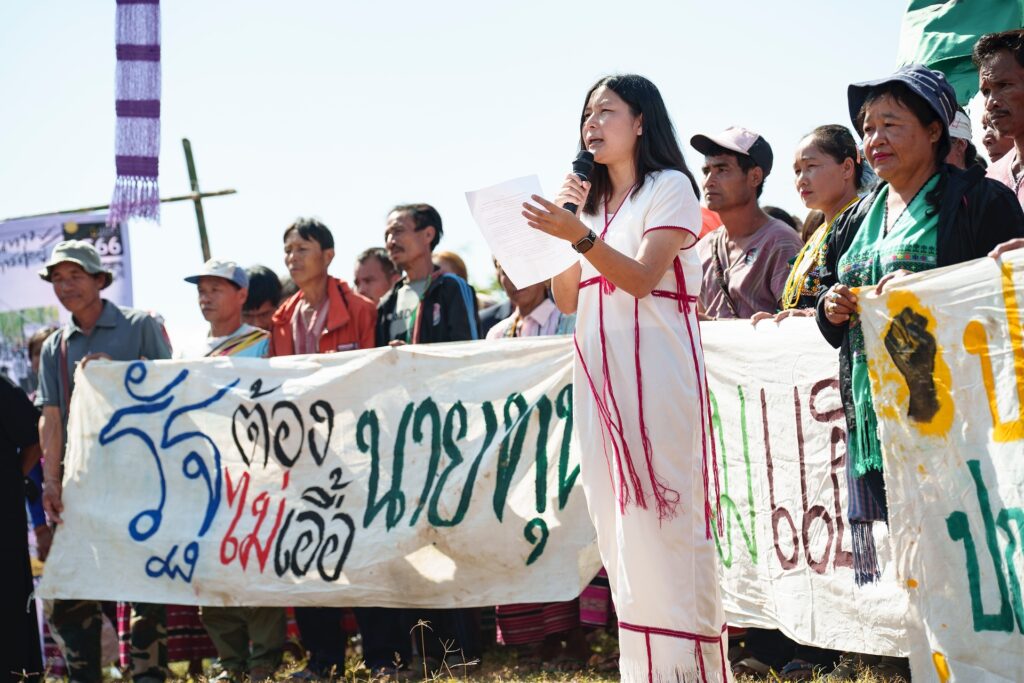
REFLECTIONS FROM OUR EXPERTS
“I don’t want to see a coal project in Omkoi. Communities should hold the power to join the decision-making process involving the Omkoi mining project. We should have the power to decide what kind of development projects are taking place in Omkoi,” said Duang Kaew, a community organizer from Kabeodin, Thailand.
This is a story of the power of resistance. Duang Kaew is an Indigenous rights activist and environmental defender who has been leading a five-year fight against a coal mining project in Omkoi, located in the Chiang Mai province of Thailand.
Since 2019, Kaew has been mobilizing communities to raise their voices against a lignite coal mining project led by mining company 99 Thuwanon Co. Ltd that will negatively impact the land and natural resources they rely on.
In the remote village of Kabeodin, in Chiang Mai, Thailand, Indigenous Karen communities have organized different actions to halt the mining project in Omkoi. For over five years, the Karen people have stood firm in protecting their land, water sources, and community resources. They have mobilized a group of villagers, including youth, women, leaders, and elders, and have employed strategies such as submitting petitions, negotiating, creating networks, learning from other communities, and filing lawsuits. They have joined forces with different communities, residents, and civil society networks.
EarthRights supports the efforts of the Indigenous communities in Kabeodin to defend their homes and lands from a project that threatens to pollute the river system and contaminate the environment, including natural resources that are crucial to the livelihood strategies of the community.
In 2024, EarthRights supported the lawyers and communities that came together to file a lawsuit at the Chiang Mai Administrative Court. The lawsuit aimed to revoke the flawed Environmental Impact Assessment (EIA) of the Omkoi coal mine project, carried out in 2010, and advocated for a new assessment to be conducted. Our partners assert that this new assessment should be conducted in a transparent manner and with meaningful participation from affected communities.
Last year, EarthRights worked with the Omkoi communities on a Community Health Impact Assessment (CHIA) process. Harms that could be caused to the traditional way of life and the culture of the Karen people by the mining project have been documented thoroughly through this CHIA. The CHIA found that the mining project violates the community’s rights to access information, to participate in project decision-making, and to live in a clean and healthy environment.
Youth activists like Kaew advocate for the rights of Indigenous Peoples to be respected, including their right to seek Free, Prior, and Informed Consent (FPIC). The project developer should seek full FPIC to operate on the Indigenous lands and territory.
EarthRights will continue to stand shoulder-to-shoulder with the communities of Omkoi to stop the mining project. The community’s stance is clear: they do not want the coal mine. The community must have the power to decide its future and manage its resources. Meanwhile, the state and corporations must stop violating community rights through unfair laws, policies, and practices. They must also restore lands previously damaged by development projects that affect livelihoods and ecosystems nationwide.
“Goliath triumphs over David in our justice system when powerful special interests can silence their critics with frivolous strategic lawsuits against public participation, or ‘SLAPPs’…We call on Congress to stand up for free speech in America — and against litigation abuse — by advancing this legislation,” said Congressman Jamie Raskin (D-MD).
EarthRights International is at the forefront of efforts to support environmental defenders who are being targeted by powerful interests in the United States. We work in close collaboration with other civil society organizations to build a unified response to these threats. In 2018, we co-founded a coalition called the Protect the Protest Task Force, which ensures that those targeted by SLAPPs and other misuses of the legal system have the support they need to continue their important work. The coalition’s motto is: If you come after one of us, you come after all of us.
In 2024, we took significant steps towards the passage of a federal law to stop SLAPPs. In December, Congressmen Jamie Raskin (D-MD) and Kevin Kiley (R-CA) introduced federal anti-SLAPP legislation in the House of Representatives, alongside Senator Ron Wyden (D-OR) in the Senate. EarthRights has actively supported Congressional leaders in these efforts and will continue to do so in the next Congress.
In the United States, companies have weaponized SLAPPs to silence environmental defenders. A corporation can silence an outspoken community or a nonprofit organization by dragging them into a years-long, multi-million-dollar lawsuit. They can also offer funding to cash-strapped local police departments in exchange for more targeted enforcement against a specific group of protesters. They can provide a well-timed campaign donation to a politician who then turns the investigative powers of a government agency or legislature into a tool of harassment.
Indeed, the U.S. fossil fuel industry appears to be using – and potentially scaling up – all of these kinds of attacks. In a 2022 investigative report, we identified 152 cases during the previous ten years where the fossil fuel industry had used SLAPPs and related legal tactics in attempts to silence or punish their critics by dragging them through long, stressful, and expensive litigation. We know this is just the tip of the iceberg.
The fossil fuel company Energy Transfer has brought one of the largest SLAPPs in U.S. history against Greenpeace USA, after the nonprofit organized de-escalation and non-violent participation training for activists protesting against the Dakota Access Pipeline. This lawsuit could bankrupt Greenpeace USA in the coming years.
Likewise, the fossil fuel industry has promoted a dangerous type of anti-protest legislation at the state level, often called “critical infrastructure laws.” These laws punish those who protest at oil and gas sites – including pipelines running through their own communities – as if they are felons or domestic terrorists. By the end of 2024, 19 states had adopted such laws.
What is happening in the United States is part of a global trend. In all regions where EarthRights works, we support environmental defenders who are leading struggles in their local communities for survival – struggles that also affect the ability of other citizens in their country to participate in national decision-making processes. These local struggles often carry enormous implications for the global climate. By protecting their forests and water sources, for example, Indigenous communities are also safeguarding the lungs of the planet.
But speaking up about the environment is risky. In every region of the world, violence against those who speak up in defense of their land and natural resources is on the rise. Hundreds of environmental defenders are assassinated each year, while thousands more face physical attacks, threats, harassment, smear campaigns, and criminalization. Data suggests that many of these attacks are linked to economic development activities – the perpetrators retaliate against those who stand in the way of profits earned from seizing land from communities to extract oil and minerals, cutting down forests for agribusiness, and dumping toxic chemicals into rivers and streams.
Looking forward, we expect that Americans who speak up about environmental issues will face an uphill battle, and the risk of retaliation is growing higher. However, EarthRights will continue to expose attempts to weaponize the legal system, ensure that at-risk activists and organizations have access to robust support, and collaborate with free speech champions across the political spectrum to ensure that we can all speak truth to power without fear of retaliation.
“This is a much larger issue than us. This is an issue of everybody being allowed to have their basic human rights, to be able to live in a safe place wherever,” Chantel Comardelle, Tribal Executive Secretary, Jean Charles Choctaw Nation, Louisiana, United States.
The climate crisis is exacerbating vulnerabilities that Indigenous, Black, Brown, immigrant, and working-class communities in the United States face as a result of long and ongoing legacies of structural discrimination. This problem is deeply intersectional – corporate exploitation and state neglect work together to deny communities their fundamental rights to a healthy environment, threaten Indigenous Peoples’ cultural survival, and prevent communities from thriving.
In light of the growing need to promote climate justice for frontline communities in the United States, EarthRights is excited to launch the Climate Resilience and Environmental Justice Project. The Project’s community-driven strategies are motivated by the goal of building community resilience, responsive to the specific challenges each of our community partners face in relation to climate change and other environmental harms.
This work is deeply aligned with – and integral to – EarthRights’ theory of change, which envisions shifting power in defense of environmental rights through work that builds powerful people and communities. Through this Project, our work in partnership with communities in the United States is growing, and we are supporting our partners on a variety of issues, including climate displacement and mitigating the harmful impacts of toxic air and water pollution.
As part of the Climate Resilience and Environmental Justice Project, in 2024 we continued our work with the Jean Charles Choctaw Nation (JCCN) of Louisiana. JCCN, considered the first community displaced by climate change in the United States, were forced to relocate after losing 98% of their ancestral lands on Isle de Jean Charles to coastal erosion, wetland destruction, and sea level rise. Last year, we supported JCCN to file a civil rights complaint with a federal agency to investigate the state of Louisiana’s implementation of a federal grant that was supposed to finance the Tribe-led resettlement of JCCN to a more resilient new lifeplace.
Currently, Tribal leaders and EarthRights lawyers continue to fight to achieve the Tribe’s original cultural and disaster resilience goals for the resettlement and to correct inadequacies in the new development, including poorly constructed homes and affordability challenges for residents.
Our climate accountability work is focused on making sure that the corporations most responsible for altering the climate are held accountable as communities increasingly face the need to take unprecedented actions, with significant costs, to adapt to and mitigate the impacts of climate change.
Our cases on behalf of Colorado communities against Exxon Mobil and Suncor seek to ensure that taxpayers aren’t stuck footing the bill alone, and that companies with significant responsibility pay their fair share of the costs. After years of litigation, in June 2024, the Boulder trial court allowed most of the claims to proceed, largely rejecting efforts to dismiss the case. In 2025, we’ll be defending that significant victory on appeal and preparing to move into the next phase of that case.
At the same time, we started to expand our work on oil and gas industry accountability, focusing more broadly on the varied ways that industry actors externalize the costs of their operations onto communities, and mislead investors, consumers, and the public about the impacts of their operations. For too long now, oil and gas companies have been able to reap the benefits of extracting natural resources without paying for the costs of the harms they inflict, leaving everyone else to clean up their mess.
We will be building out our upstream fossil fuel cleanup work in 2025, focused on addressing these market failings, using litigation and other legal actions to enhance community resilience, ensure government actors strengthen and enforce the rules and regulations governing oil and gas companies, and holding corporate actors responsible when they cause or contribute to harm.
“Indigenous Peoples, regardless of where they live, have a strong connection to natural resources. Without natural resources, their culture would quickly vanish. When the forest is lost, Indigenous culture declines as well,” Ven Che, an activist from the Tompaun Indigenous community, Cambodia.
Myanmar and Cambodia are two of the most vulnerable countries in the world when it comes to the climate crisis. While they have long borne the brunt of the very projects and industries that created the climate crisis in the first place, they also face the disproportionate impacts of climate solutions. The harms of the Global North’s false solutions are compounding the inequities faced by communities we are working with in these countries.
Cambodia provides a disproportionate share of carbon credits on voluntary global markets. Whether such credits make any contribution to our efforts to mitigate global heating is a point of debate, but what is beyond contention is that in Cambodia, carbon credit projects displace Indigenous communities from forests that they have stewarded for generations. This is done without meaningful consultation, let alone their consent. Community members have been beaten, evicted, arbitrarily detained, and their property set alight. The standards bodies, auditors, and conservation non-profits that preside over these human rights abuses are often based in the Global North.
Around 1,000 miles away, Kachin State in northern Myanmar is being used as a sacrifice zone for the energy transition. Kachin provides perhaps 60% of the global supply of heavy rare earths used to manufacture magnets. These magnets are primarily used in electric vehicles and wind turbines, even when alternatives, such as geared turbines, are readily available. The mining process, “in situ” leaching, pours vast quantities of chemicals into pipes inserted into the hillsides, collecting them in pools after it seeps out of the bottom. Approximately 6,000 pools are now scattered across Kachin, often abandoned with tons of toxic sludge. Watersheds in biodiverse lands across Indigenous communities are being contaminated with heavy metals, while landslides and exposure to toxic substances are resulting in the deaths of dozens of mine workers.
Throughout 2024, EarthRights worked with affected Indigenous communities in Myanmar and Cambodia to document these harms and hold local authorities and international stakeholders to account. This has included water testing, land use mapping, developing advocacy strategies, facilitating engagement with actors in supply chains, and analyzing compliance with human rights standards and legal obligations.
TRAINING ENVIRONMENTAL DEFENDERS

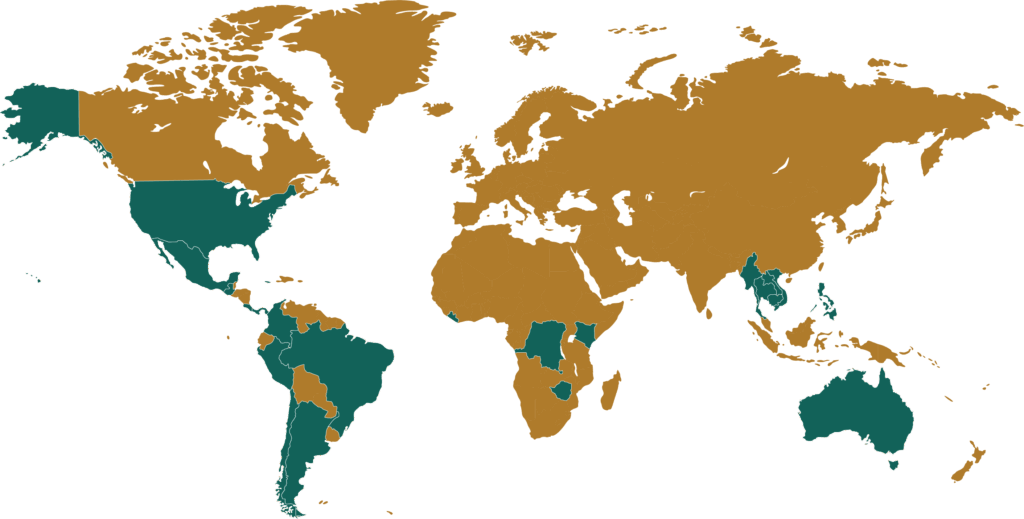


FUNDING PARTNERS
EarthRights is grateful to our generous donors for their sustaining support, including those who wish to remain anonymous. Thank you.
Louis and Anne Abrons Foundation
Dunn Family Charitable Foundation
FJC – A Foundation of Philanthropic Funds
Dan Gerard
Martha Bosse Lane
Roger and Margot Milliken
The San Francisco Foundation
$5,000-$9,999
Joy and Paul Adams
Armstrong Foundation
The Arpels Family
Chino Cienega Foundation
The Edouard Foundation
Lucille Glassman
Blaire Glennon
Mark Houghton
Polly Howells
Kelly and Robert Kaplan
Terry Lynn Karl
The Rosewater Fund
Steve and Emmy Stanley
$2,500-$4,999
Nancy Anderson
Arthur and Elaine Aron
Robyn Daly
Kevin Dargie
Kristian and Brittany Glenn
Kuhn Foundation
Sheila Leete
Kate Maruca
Jake O’Brien
Anthony Pellittieri
Dana Polk and James Borninski
Karen Robinson-Cloete and Johannes Cloete
$1,000-$2,499
Jeffrey Arnett
Anthony and Virginia Barron
Paul Beach
Blaine Bookey
Brenda and Arthur Bright
Judith Carney
Charles Cohen
Ingrid Cordes
Jeff Eaton
Elizabeth Ebel-Nuwayser and Peter Nuwayser
Aaron Eske
Susanne Essex
Peter Ewell and Helga Recke
Jennie Farshchian
Lauren Feldman and Alban Pyanet
Daniel Fishbein
Tracy Forgie Koppel
Scott Gilkeson and Kristin Staroba
Hana Glaser
Elizabeth Glusman
Catherine Greene and Eric Herrmann
Karen Hofman and Dr. Daniel Bradlow
Joseph Jackson and Joann Leskovar
Mary and Richard Jaffe
Marlon Kobacker
Dr. Robert Lang
Mildred Langston
Laura and Barry Levine
Christopher Lewis
Nancy Maisano
Anne Manuel and Bill Mascioli
Emma Mattson
Patricia McMillen
Michael Messmer
Nicholas Miller
Shalini Nataraj
Sarah Oakes and Michael Joseph Pierce
Mr. Raymond Paretzky and Ms. Karen Zacharia
Jack Peace and Paul Devine Bottone
Neil Popovic
Frederick Roses and Deidre Brown
Caitlin Russell
Jeremy Scheidt
John Shalanski
Stephen and Fiona Shore
Paul Silver and Christina Marra
Sheila Vegari
Fernando Viton
Marcy Whitebook and Charles Price
Shannon Young
$500-$999
Cindy Basso
Richard Bentz
Michael Bowling
Margaret Bowman and David Hunter
Zachary Brown
Christopher Buck
Susan Burns
Chicago Community Foundation
Stanley Corfman
Doktori Family Foundation
Jacqueline and Mark Donowitz
Shannon Downey and Guillaume Turpin
Patricia Dranoff
George Flores
Renner-Grace Fund
Peggy Gartner
Carol Gibbons
Pamela Graham
James Green
William Hathaway
Todd Hilson
Devon Hoppe
Gerard Hormiga
Sarah Jaffe
Nasreen Jordan
Dominic Joris
Paul and Anne Koeppe
Lexi and Ken Kowalik
Tom Kreutz and Liz Cutler
Rochelle Lee
Ryan Leenay
Maura Lightfoot
Amol Mehra
Mary Katherine Morn
Huong Nguyen
Anastacia Nutt
Nora Quinn
Alan Rowe
Avery and Michael Sadoff
Matthew Scarlato
Jennifer Schumann
Kevin Segall and Stephanie Rogers
Kathryn Sheibley
Catherine Thatcher
Stefano Vicini
Thank you to our monthly donors and all of the donors who give gifts ranging from $5-$499.
American Jewish World Service
Bertha Foundation
Blanchette Hooker Rockefeller Fund
Bloomberg Philanthropies and the Global Health Advocacy Incubator
Broad Reach Fund
Climate and Land Use Alliance
Conservation Food & Health Foundation
CS Fund
David & Lucille Packard Foundation
Environmental Defenders Collaborative
Equation Campaign
Flora Family Foundation
Ford Foundation
Heinrich Boll Stiftung
Impact Fund
Justice Catalyst
Kaplan Family Fund
Libra Foundation
National Endowment for Democracy
Open Society Foundations
Philoge Fund
Porticus
Rockefeller Brothers Fund
Rockefeller Family Fund
Sall Family Foundation
Swedish International Development Cooperation Agency
Swift Foundation
U.S. Bureau of Democracy, Human Rights, Labor and the American Bar Association
Wallace Global Fund
Waverly Street Foundation
Wellspring Philanthropic Fund
World Peace Service – Weltfriedensdienst e.V.
Join the fight to achieve climate justice, protect defenders, and demand corporate accountability.
FINANCIALS
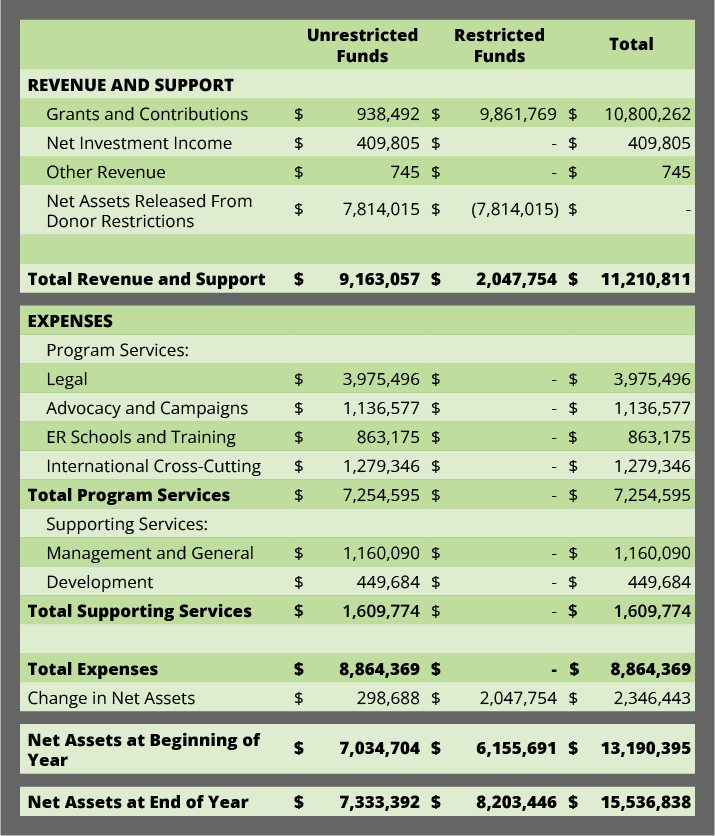
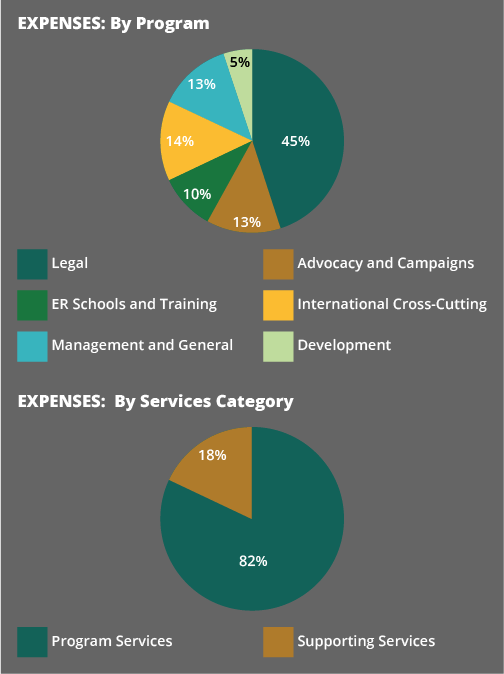
BOARD OF DIRECTORS
SHALINI NATARAJ, Co-Chair
GRACIEL M. MERCEDES LU (MECHE), Co-Chair
FERNANDA HOPENHAYM, Treasurer
NEIL POPOVIĆ
AMOL MEHRA
DAN GERARD
SOLINN LIM
RACHEL GORE-FREED
KRISTIN CASPER*
JONATHAN KAUFMAN*
*Joined in 2025
LETTER FROM THE EXECUTIVE DIRECTOR
We knew 2024 would be a pivotal year for us at EarthRights, and we stepped into it with purpose. Our goals were clear: to successfully navigate a major leadership transition and to chart a bold course through an ambitious strategic plan.
As the year unfolded, our purpose was matched by progress. We celebrated landmark legal victories in cases on behalf of communities in Colombia and Honduras – powerful reminders that justice is not only possible, but that our clients and partners are leading the way. These wins were more than courtroom successes, they served as proof that our partners – communities who have suffered the most from corporate abuses – are not passive victims. They are agents of change, and they are the very people reshaping legal systems, challenging entrenched power, and redefining accountability.
These victories also reaffirmed the role of EarthRights in the global movement for climate justice, human rights, and corporate accountability. In a world where climate disruption is accelerating, corporate harm often goes unchecked, and threats against advocates continue to rise, our victories remind us where we’re most needed and most effective.
By year’s end, the urgency of our mission had only intensified. After the 2024 United States presidential elections, we saw mounting threats in the U.S. and beyond: the rollback of environmental protections, erosion of democratic safeguards, and increasing challenges to our ability to freely do our work. Indeed, today, we are witnessing a dangerous erosion of the very idea that the law should protect the vulnerable over the powerful.
But we are not going anywhere.
Over the last thirty years, our landmark legal victories, successful campaigns, and transformative training programs have enabled communities to challenge harmful practices and defend their rights. These successes have shaped our identity as an organization and have deepened our understanding of the power of long-term, trust-based relationships.
We enter 2025 more determined than ever to achieve bigger and pursue our vision: a world where every community has the power to seek justice, defend their rights, and hold corporations, financial institutions, and governments accountable; where people live with dignity and self-determination, and where the environments that sustain us are fiercely protected and restored.
Looking ahead, we will continue undeterred to advance community justice, corporate accountability, the protection of defenders, and the laws and policies that strengthen human and environmental rights.
Because as we’ve learned from the foothills of the Andes to the jungles of Myanmar: When we organize, act with courage and clarity, and practice solidarity, we can win.
